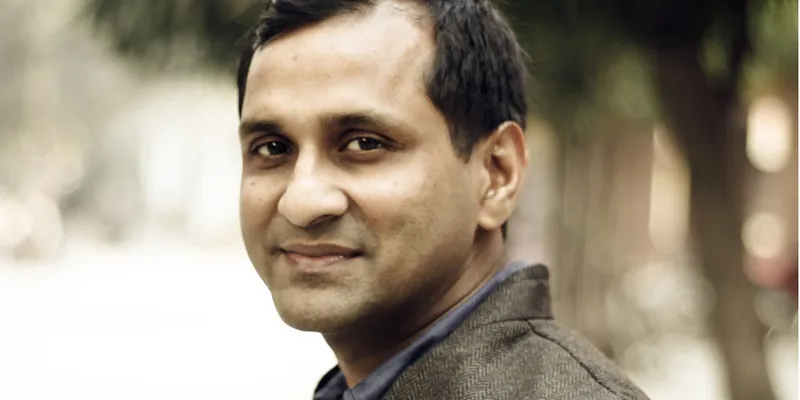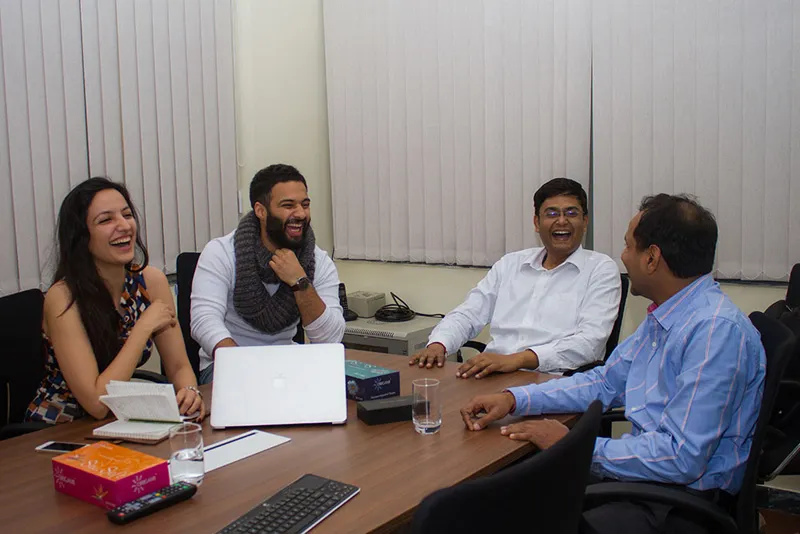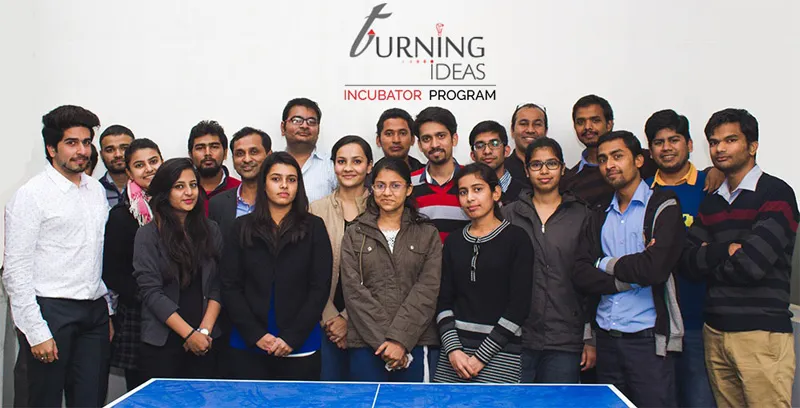‘No idea is bad, it is great if you can begin thinking’ - Ashish Mittal, TurningIdeas incubator
[This article is part of the YourStory series Startup Hatch, about incubators, accelerators and makerspaces in the startup ecosystem. See earlier profiles of initiatives at IIT Bombay, IIM Bangalore, BITS Pilani, NCL, Tata Elxsi, Axilor, NID, IIIT-Bangalore, IIIT-Hyderabad, Vellore Institute of Technology, PSG Coimbatore, Workbench Projects, Makers Asylum and Appy Hours.]
Ashish Mittal is Chief Mentor and Founder of TurningIdeas Solutions, an incubator responsible for mentoring technology startups. He is also an angel investor and speaker at multiple startup events. Ashish has over 19 years of experience in the media and telecom sector, with companies such as Google, Microsoft, Oracle, IBM India, IBM Research Labs, Ericsson and HP. He has a Master’s in Consultancy Management and Bachelor of Engineering from BITS Pilani.

Ashish joins us in this interview on the opportunities for entrepreneurs in India, the startup mindset, and support available from the incubator ecosystem.
YS: What was the founding vision of TurningIdeas, and how is it supported?
AM: TurningIdeas started with a vision of replicating Harvard and Stanford in India to give an equal playing ground to young entrepreneurs who dare to dream big. We provide mentoring, technology, co-working and funding support. TurningIdeas is supported by a team of professionals who have had long careers with global tech companies, in areas like legal, finance, technology, marketing and strategy.
We offer both virtual and physical incubation. For virtual incubation of three months we charge Rs 9,999 per month and two percent advisory equity. For onsite incubation, the equity varies based on the involvement.
YS: Which companies have graduated from TurningIdeas so far, and which are currently being incubated?
AM: We have supported companies in commerce and ed-tech. AskMyGift (founded by Sumeet Agarwal) is a gifting platform for all type of gifts, and aims to delight the giver and receiver. Swagbag (founded by Shagun Nayyar) helps identify prospects in physical retail stores, along with customer likes and dislikes. FutureVidya offers technology to redefine teaching and learning processes via classroom productivity tools.
We have three startups currently under incubation: StoryWalker (founder: Antony Rajkumar), Plown (founder: Adarsh Sharma) and Buddy4Study (founder: AshutoshKumar).
YS: What would you say are the top three opportunities for Indian entrepreneurs?
AM: We believe the top three opportunities for Indian entrepreneurs are in education, healthcare and IoT/mobile. There is wide scope of improvement and advancement in the sector of education, not only in terms of quality but with sheer volume - only 60 percent of children go to schools. In the education system, the problem is that we currently teach what we want to teach and not what learners want to learn.
As for healthcare, one of the essential factors of any economy to measure growth and development is healthcare; there is huge scope for improvement here. This applies not just to the core healthcare sector but related issues like sanitation.
YS: What are the key challenges faced by startups in India, and how can you help bridge the gap?
AM: The key challenges in the Indian startup ecosystem include social pressure, lack of ecosystem support, and difficulty of doing business. There is pressure when it comes to acceptance of failure; one needs to realise that there are many factors governing the success of any idea or venture apart from the effort put in. The most important factor here is to learn from failure and think of something better, rather than be demotivated.
Government regulations with respect to funding need to improve, and ease of doing business needs to be smoother.
YS: What are the unique challenges for social entrepreneurs as compared to tech or profit-led enterprises?
AM: The ability to scale proposed solutions through replication and growth is a key challenge. Social entrepreneurs also need funding to support their venture. They need widespread acknowledgement as well. Profit-led enterprises have vast reach due to availability of huge funds and fat investments, which is not the case in social entrepreneurship.
There is also resistance to change. People take time to adjust to new changes, and social entrepreneurship is still new and sometimes considered a taboo. Perhaps continued oppression and long-term presence of social problems leads to reluctance for change.
YS: What are the selection criteria for startups in TurningIdeas?
AM: We look for domain agnostic technology enabled ventures. They should be disruptive, scaleable, at early stages, and have a passionate team. An TurningIdeas, we focus on deviation from the usual; innovation is praised and promoted. Being innovative has no set pattern or theorem, it is all about observation and looking for a new bubble of advancement.
Reliability and long-term functioning of an organisation are two major success factors for a startup to withstand storms. With every single step there must be a vision for the next ten steps, what we call a stair to prosperity.
The team must be passionate and stick to the plan no matter how bad it rains. They must set their goal and pursue it, perhaps looking for alternatives but without dropping the whole idea.

YS: What support and services do startups receive?
AM: We provide mentoring, investor connects, co-working spaces and shared functional teams. We try our best to be there at every possible step of the founders and during their plan to make sure they are right on track. We connect founders to those who can financially support them, and advise them along the process.
We also give space for the ‘base camp’ for physical launch of the startup, along with shared teams for technology, business, marketing and so on. We provide teams of professional tech-savvy people, social media managers and other activity managers to assist startups wherever necessary.
YS: What kinds of IP are being created by your startups?
AM: Our startups are creating cloud SaaS-based products, B2C mobile solutions with patented algorithms, and disruptive solutions for offline retail.
YS: How would you differentiate TurningIdeas from the other incubators in the field?
AM: Many incubators and accelerators are limited to co-working spaces. Our differentiation is end-to-end mentoring for startup scale, problem validation, solution scoping, product discovery, design, architecture, and technology support.
We host multiple solutions for problems ranging from minor technical glitches to major game changing plans. We also provide go-to-market assistance, finance, brand and strategy support, and fundraising. We work with startups even at ideation stage, the whole idea is to turn ideas into reality with continuous support.
YS: What would you define as success for TurningIdeas?
AM: Success will translate into every young professional considering starting up as a viable option without fear of failure. This will be achieved through process-based mentoring and incubation support to every corner of the nation so that no future founder fails because of lack of mentoring and support.
YS: How do you compare and contrast India’s incubators and accelerators with those of other countries like the US and China?
AM: US and China have a lot of funding support. The social ecosystem accepts failure and rewards innovation. The government and education ecosystem are actively involved in entrepreneurship.
YS: What are your plans for the coming years with respect to new startups?
AM: We will focus on startups which are solving key issues which affect the masses. We will work on scalable ventures to reach profitability more rapidly. We want to promote creativity with innovation for not just tech or profit based startups, but social entrepreneurship as well.

YS: What are your recommendations for policymakers to make business easier for incubators and startups in India?
AM: There should be more brainstorming sessions from an early age to promote the idea of thinking creatively. Vocational education should be promoted to actually develop practical know-how rather than just theoretical knowledge.
Nothing speaks louder than money, there should be more financial support for entrepreneurs. Innovation should be more rewarded. Like SEZ, the government should be setting up STZ (‘Startup Zones’), or areas where like-minded people can collaborate and address some really big problems.
There should be more linkages for ‘intra-startups.’ For example, marketing startup support for a tech startup. A big initial step is needed, and things will fall in place automatically, though gradually.
YS: What are your recommendations to the startups and entrepreneurs in our audience?
AM: At least think! No idea is bad, it is great if you can begin thinking. You already outshine a thousand others once you think, after that all you may need is improvisation. Try to get in touch with experts in your field for first-hand experience; no one can suggest better, warn you about ups and downs, or tell you what success is.
Get in touch with your audience regularly to know what is actually demanded. Be aware about what is in the market - try to be ‘hatke’ and not a second copy of something else. Whatever you think of, try putting it in writing - if you can’t write about it, it probably will never work. That is the first check!







